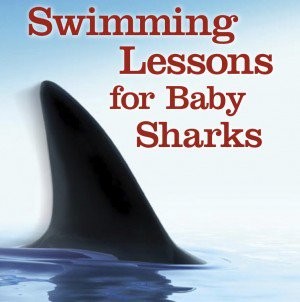Swimming Lessons For Baby Sharks, Practical Advice For New Lawyers
Being a lawyer can be fascinating and rewarding. But it’s not as glamorous as media portrayals.

Q: I’m a freshman in High School, and I want to prepare to become an attorney. I have already done a bit of research, but there are still a few questions that I have (below).
A: Excellent! You are preparing early! Being a lawyer can be fascinating and rewarding. But it’s not as glamorous as media portrayals. As you progress in your education, learn about legal careers, but keep an open mind about other fields. There is a lot to explore in the world!

Legal AI: 3 Steps Law Firms Should Take Now
Here are your questions and my answers:
- What job should I get in college if I’m planning to become an attorney?
If you can swing it financially, I recommend not working during the school year. Focus on college and keeping up your grades, because your college transcript will matter when you are applying to law schools. During the summer (and if you need to work during the school year), here are some options to consider:
- Assisting public policy advocacy groups.
- Working for local, elected officials.
- Doing research and writing for a college professor.
- Working at small law firms or other legal organizations – if you can shadow a lawyer as part of the deal.
Sponsored

Generative AI In Legal Work — What’s Fact And What’s Fiction?


The Business Case For AI At Your Law Firm


Legal AI: 3 Steps Law Firms Should Take Now

Navigating Financial Success by Avoiding Common Pitfalls and Maximizing Firm Performance
You will benefit from any job that will help you develop research, writing or analytical skills. And if you are considering private practice, any job that helps you understand business and finance can also help. (Many lawyers need to know how to read financial statements, for example.)
My list above includes a caveat about law firms, because without a law degree you can’t perform functions that could give you significant insights into practice. But going to court with a lawyer (except as a defendant) can be a great learning experience.
Local bar associations may have useful programs, and if you can spend any time in Washington DC in the summer, the American Bar Association provides a list of programs for middle and high school students.
- Are there any jobs that I can do before college that are involved with the law?
I would focus on organizations that research or advocate on public policy issues. But don’t let your grades suffer.
Sponsored

Navigating Financial Success by Avoiding Common Pitfalls and Maximizing Firm Performance

Is The Future Of Law Distributed? Lessons From The Tech Adoption Curve
- What Bachelor’s degree should I pursue in college?
Take a variety of classes, and pursue a degree in an area that fascinates you. If you are passionate about your studies, you are more likely to excel. And you should enjoy college. It may be your last, best chance to take esoteric classes that have little or no “practical” value. In exploring classes, you might even decide something else is more enthralling that being a lawyer. That is fine – and much better to discover before you are halfway through law school.
Because laws intersect with virtually every endeavor, students enter law school with many different degrees. Although most patent lawyers have engineering or science degrees, just about any liberal arts degree can serve as a solid foundation for law school. But I am not a fan of undergraduate “pre-law” programs. You will learn the law in law school. In college, do what you love.
- What can I do in High School to help prepare for becoming an attorney?
On this question, I can’t be any more articulate than the American Bar Association’s essay on the topic. And not surprisingly, the ABA agrees with me about undergraduate degrees: “The ABA does not recommend any undergraduate majors or group of courses to prepare for a legal education.”
Good luck!
Join the conversation by submitting questions on Twitter @Babysharklaw or here. Get the new Second Edition of Swimming Lessons for Baby Sharks here.
Grover E. Cleveland is a Seattle lawyer, speaker and author of Swimming Lessons for Baby Sharks: The Essential Guide to Thriving as a New Lawyer (West 2d. 2016). Grover specializes in programs to help new lawyers successfully transition from law school to practice, helping them provide more value and avoid common mistakes. He is a former partner at Foster Pepper PLLC, one of the Northwest’s larger firms. His clients included the Seattle Seahawks and other entities owned by Microsoft co-founder, Paul Allen. Grover is a frequent presenter on lawyer career success and generational issues at leading law firms and schools nationwide. Many questions in this column come from those programs. Readers may submit questions here or follow him on Twitter @Babysharklaw. He is not related to the 22nd and 24th President of the United States.







